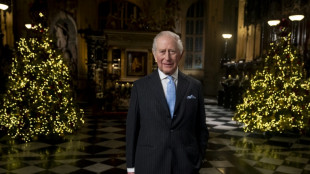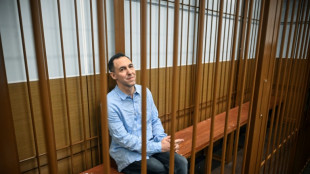
-
 Australia all out for 152 as England take charge of 4th Ashes Test
Australia all out for 152 as England take charge of 4th Ashes Test
-
Boys recount 'torment' at hands of armed rebels in DR Congo

-
 Inside Chernobyl, Ukraine scrambles to repair radiation shield
Inside Chernobyl, Ukraine scrambles to repair radiation shield
-
Bondi victims honoured as Sydney-Hobart race sets sail

-
 North Korea's Kim orders factories to make more missiles in 2026
North Korea's Kim orders factories to make more missiles in 2026
-
Palladino's Atalanta on the up as Serie A leaders Inter visit

-
 Hooked on the claw: how crane games conquered Japan's arcades
Hooked on the claw: how crane games conquered Japan's arcades
-
Shanghai's elderly waltz back to the past at lunchtime dance halls

-
 Japan govt approves record 122 trillion yen budget
Japan govt approves record 122 trillion yen budget
-
US launches Christmas Day strikes on IS targets in Nigeria

-
 Australia reeling on 72-4 at lunch as England strike in 4th Ashes Test
Australia reeling on 72-4 at lunch as England strike in 4th Ashes Test
-
Too hot to handle? Searing heat looming over 2026 World Cup

-
 Packers clinch NFL playoff spot as Lions lose to Vikings
Packers clinch NFL playoff spot as Lions lose to Vikings
-
Guinea's presidential candidates hold final rallies before Sunday's vote

-
 Eon Prime Intelligent Alliance Office Unveils New Brand Identity and Completes Website Upgrade
Eon Prime Intelligent Alliance Office Unveils New Brand Identity and Completes Website Upgrade
-
Villa face Chelsea test as Premier League title race heats up

-
 Spurs extend domination of NBA-best Thunder
Spurs extend domination of NBA-best Thunder
-
Malaysia's Najib to face verdict in mega 1MDB graft trial

-
 King Charles calls for 'reconciliation' in Christmas speech
King Charles calls for 'reconciliation' in Christmas speech
-
Brazil's jailed ex-president Bolsonaro undergoes 'successful' surgery

-
 UK tech campaigner sues Trump administration over US sanctions
UK tech campaigner sues Trump administration over US sanctions
-
New Anglican leader says immigration debate dividing UK

-
 Russia says made 'proposal' to France over jailed researcher
Russia says made 'proposal' to France over jailed researcher
-
Bangladesh PM hopeful Rahman returns from exile ahead of polls

-
 Police suspect suicide bomber behind Nigeria's deadly mosque blast
Police suspect suicide bomber behind Nigeria's deadly mosque blast
-
AFCON organisers allowing fans in for free to fill empty stands: source

-
 Mali coach Saintfiet hits out at European clubs, FIFA over AFCON changes
Mali coach Saintfiet hits out at European clubs, FIFA over AFCON changes
-
Last Christians gather in ruins of Turkey's quake-hit Antakya

-
 Pope Leo condemns 'open wounds' of war in first Christmas homily
Pope Leo condemns 'open wounds' of war in first Christmas homily
-
Mogadishu votes in first local elections in decades under tight security

-
 'Starting anew': Indonesians in disaster-struck Sumatra hold Christmas mass
'Starting anew': Indonesians in disaster-struck Sumatra hold Christmas mass
-
Cambodian PM's wife attends funerals of soldiers killed in Thai border clashes

-
 Prime minister hopeful Tarique Rahman arrives in Bangladesh: party
Prime minister hopeful Tarique Rahman arrives in Bangladesh: party
-
Pacific archipelago Palau agrees to take migrants from US

-
 Pope Leo expected to call for peace during first Christmas blessing
Pope Leo expected to call for peace during first Christmas blessing
-
Australia opts for all-pace attack in fourth Ashes Test

-
 'We hold onto one another and keep fighting,' says wife of jailed Istanbul mayor
'We hold onto one another and keep fighting,' says wife of jailed Istanbul mayor
-
North Korea's Kim visits nuclear subs as Putin hails 'invincible' bond

-
 Trump takes Christmas Eve shot at 'radical left scum'
Trump takes Christmas Eve shot at 'radical left scum'
-
3 Factors That Affect the Cost of Dentures in San Antonio, TX

-
 Leo XIV celebrates first Christmas as pope
Leo XIV celebrates first Christmas as pope
-
Diallo and Mahrez strike at AFCON as Ivory Coast, Algeria win

-
 'At your service!' Nasry Asfura becomes Honduran president-elect
'At your service!' Nasry Asfura becomes Honduran president-elect
-
Trump-backed Nasry Asfura declared winner of Honduras presidency

-
 Diallo strikes to give AFCON holders Ivory Coast winning start
Diallo strikes to give AFCON holders Ivory Coast winning start
-
Spurs captain Romero facing increased ban after Liverpool red card

-
 Bolivian miners protest elimination of fuel subsidies
Bolivian miners protest elimination of fuel subsidies
-
A lack of respect? African football bows to pressure with AFCON change

-
 Trump says comedian Colbert should be 'put to sleep'
Trump says comedian Colbert should be 'put to sleep'
-
Mahrez leads Algeria to AFCON cruise against Sudan


Nobel scientist uncovered tiny genetic switches with big potential
Harvard geneticist Gary Ruvkun vividly remembers the late-night phone call with his longtime friend and now 2024 Nobel Prize in Medicine co-laureate Victor Ambros, when they made their groundbreaking discovery of genetic switches that exist across the tree of life.
It was the early 1990s. The pair, who had met a decade earlier and bonded over their fascination with an obscure species of roundworm, were exchanging datapoints at 11 pm -- one of the rare moments Ambros could steal away from tending to his newborn baby.
"It just fit together like puzzle pieces," Ruvkun told AFP in an interview from his home in a Boston suburb, shortly after learning of the award on Monday. "It was a eureka moment."
What they had uncovered was microRNA: tiny genetic molecules that act as key regulators of development in animals and plants, and hold the promise of breakthroughs in treating a wide range of diseases in the years ahead.
Although these molecules are only 22 "letters" long -- compared to the thousands of lines of code in regular protein-coding genes -- their small size belies their critical role as molecular gatekeepers.
"They turn off target genes," Ruvkun explained.
"It's a little bit like how astronomy starts with looking at the visible spectrum, and then people thought 'If we look with X rays, we can see much higher energy events,'" he added.
"We were looking at genetics at much smaller scales than it had been looked at before."
- Dismissed at first -
Their discovery had its roots in early investigations into C. elegans, a one-millimeter-long roundworm.
Ambros and Ruvkun were intrigued by the interplay between two genes that seemed to disrupt the worm's normal development -- causing them either to stay in a juvenile state or acquire adult features prematurely.
The genetic information contained in all our cells flows from DNA to messenger RNA (mRNA) through a process called transcription, and then on to the cellular machinery where it provides instructions on which proteins to create.
It's through this process, understood since the mid-20th century, that cells become specialized and carry out different functions.
But Ambros and Ruvkun, who began their work in the same lab before moving to different institutions, discovered a fundamentally new pathway for regulating gene activity through microRNAs, which control gene expression after transcription.
They published their findings in back-to-back papers in Cell in 1993, but at first, the discovery was dismissed as an esoteric detail, likely irrelevant to mammals.
"We were considered an oddity in the world of developmental biology," Ruvkun recalled. Even he had little idea their work would one day be celebrated by the wider scientific community.
That all changed in 2000 when Ruvkun's lab discovered another microRNA that was present throughout the tree of life -- from roundworms to mollusks, chickens, and humans.
- 'Celebrating like crazy' -
At the time, the human genome was still being mapped, but the portion that was complete was available to researchers.
"I think it was probably one-third done, and I could already see (the new microRNA) in that one-third of the human genome," said Ruvkun. "That was a surprise!"
Since then, the microRNA field has exploded, with more than 170,000 citations currently listed in biomedical literature.
More than 1,000 microRNAs have been identified in human DNA, and some are already being used to better understand tumor types and develop treatments for people with chronic lymphocytic leukemia.
Trials are also underway to develop microRNAs as treatments for heart disease.
On the morning of their Nobel win, the two old friends "Facetimed and high-fived," Ruvkun said. "It's magnificent, and we're going to be celebrating like crazy."
A.Mahlangu--AMWN


